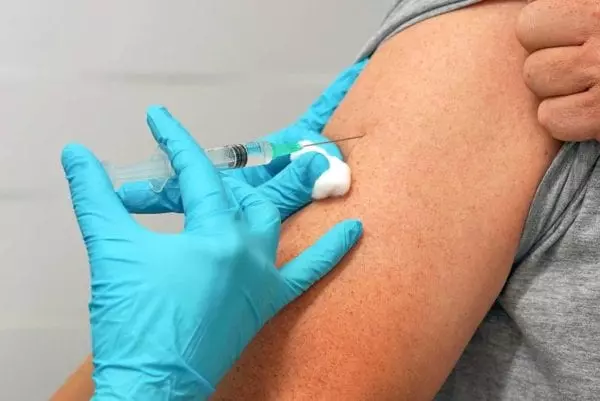
A previous clinical trial demonstrated success treating prostate cancer with a UV1 vaccine. The vaccine targets telomerase, a protein. Both mesothelioma and prostate cancer produce large amounts of this protein.
Because of this similarity, mesothelioma patients may experience similar success with the vaccine. Researchers will test the vaccine in a clinical study for pleural mesothelioma patients.
How Does a Cancer Vaccine Work?
The vaccine in these particular studies is a UV1 vaccine. This vaccine teaches the immune system to identify and attack cells making large amounts of telomerase.
All cells have the blueprints to make telomerase. However, not all cells use the blueprints to constantly make telomerase. Some cancer cells produce large amounts of the protein, including prostate cancer and mesothelioma.
The UV1 vaccine may be able to target these cells and kill them without harming too many healthy cells. As with any vaccine, UV1 uses small fragments of protein to teach the immune system what to attack. For UV1, the small pieces of protein come from telomerase.
The part of the immune system that attacks the cancer cells are T cells. Over time, the T cells may be able to stop tumor growth or potentially kill all tumor cells.
Why Is This Vaccine Promising?
The UV1 vaccine is promising based on a previous study conducted with prostate cancer patients. The study involved 22 men diagnosed with prostate cancer. They were scheduled to have 13 vaccine injections over the course of 25 weeks. Researchers monitored immune response, disease progression and side effects.
Study results:*
- 18 patients demonstrated an immune response
- 13 patients who received at least 10 vaccinations had a decline in prostate-specific antigen (PSA)
- 10 patients had no evidence of cancer cells in the prostate via MRI imaging
- 17 patients (77%) had clinically stable disease by the end of the study
*Not all patients received all 13 injections. While 18 patients received all 13 vaccinations, 3 patients received 10 vaccinations and 1 patient received 7 vaccinations. Some patients also received radiation.
Patients also demonstrated minimal serious side effects.
What Does This Mean for Mesothelioma?
Researchers hope to see results for mesothelioma patients similar to those from the prostate cancer study. Although the cancers are very different, researchers recognize the similarities with telomerase production.
Ideally, the vaccine would target and kill mesothelioma cancer cells. This could stop the cancer from progressing or eradicate the cancerous cells altogether.
The prostate cancer study focused on short-term results. Researchers cannot confidently predict the likelihood of long-term success as a mesothelioma treatment.
Details of the Mesothelioma Cancer Vaccine Study
The mesothelioma UV1 vaccine study will involve 118 patients with the following characteristics:
- Diagnosis of malignant pleural mesothelioma
- Adequate organ function
- Ineligible for curative surgery
- No history of immune-checkpoint-inhibitor treatment
Additional requirements are available on the study’s ClinicalTrials.gov Study Record Detail.
Patients will be treated with Yervoy®️ (ipilimumab) and Opdivo®️ (nivolumab). Both are immunotherapy drugs. The UV1 vaccine will serve as a second-line treatment.
To determine the success of the UV1 vaccine, one group will receive only the immunotherapy drugs. A second group will receive immunotherapy and the vaccine. Preliminary study results are expected in 2022.
What Are Potential Side Effects of the Cancer Vaccine?
UV1 side effects are unknown for mesothelioma patients. However, side effects from the prostate cancer study include:
- Itching at the injection site
- General itchiness
- Frequent daytime urination
- Diarrhea
- Hot flashes
Patients undergoing any cancer treatment should discuss side effects with their physician. Treatment plans vary for every patient. Multiple patient characteristics may affect treatment eligibility.
Clinical trials, in particular, have set requirements. If interested in a clinical trial, patients should talk with a mesothelioma specialist.




